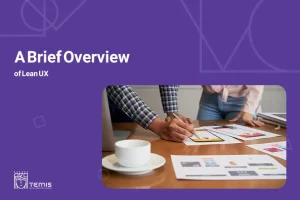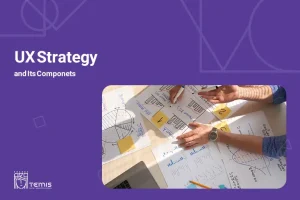When it comes to content organization on modern websites, there are two main options: pagination vs infinite scroll. Paginated sites divide their content into separate pages (think Google!), while infinite-scrolling sites condense everything onto a single page. Neither option is perfect – consider your website’s core purpose when choosing which approach will work best for you! In this article, we will discuss infinite scroll vs pagination, the Pros and Cons of each one, and when to use them in UI&UX design services.
Table of Contents
What is pagination?
Breaking digital content into multiple pages can make navigation smoother and more accessible for users. With pagination, they no longer need to scroll through long lists of related items to find what they’re looking for – instead, all that’s required is a couple of clicks on the conveniently located numbered links at the bottom of each page! Whether it be an informative article or a convenient product comparison tool, paginated content offers website visitors quick access without tedious searching.
Pagination UX: The Classic Approach
Conversely, pagination UX involves dividing content into discrete pages, usually denoted by page numbers or arrows. Users can click on these links to navigate from one page to another. This method has been the traditional approach to content organization on the web.
Pros of Pagination:
- Clear Navigation: Users have a straightforward way to jump to specific content sections, making it easier to find previously viewed information.
- Predictability: Users know how much content is available and can gauge their progress through the website.
- SEO Benefits: Search engines can better index paginated content, improving rankings.
- Faster Load Times: Loading smaller chunks of content per page can lead to faster initial page loads.
Cons of Pagination:
- User Friction: Users might need help to click through multiple pages, especially when looking for specific information.
- Lower Engagement: Pagination can lead to higher bounce rates if users are unwilling to click through several pages.
- Mobile Usability: Pagination can be less user-friendly on mobile devices because of the smaller screen size and the need for precise tapping on page navigation elements.
What is an infinite scroll?
With infinite scroll, a website visitor is never left wanting more content. A single page seamlessly brings forth an unfettered stream of information with every scroll to the bottom – creating an immersive, almost otherworldly experience that beckons one further and further down the rabbit hole!
Infinite Scroll UX: The Seamless Flow
Infinite scroll UX is known as a web design technique. Where additional content loads automatically as the user scrolls down the page. It creates a seamless, continuous flow, eliminating the users need to click on pagination links or buttons to access more content. Social media like Facebook, Twitter, and Pinterest have popularized this method, providing users endless content.
Pros of Infinite Scrolling:
- Endless Exploration: Users can effortlessly explore a vast amount of content without the interruption of page reloads or clicks.
- Engagement Boost: Infinite scrolling can lead to higher user engagement and longer time spent on the website, as users tend to scroll further to discover more content.
- Mobile Friendliness: For mobile users, infinite scrolling is intuitive and convenient, simplifying navigation on smaller touch-screen devices.
- Visual Appeal: The continuous flow of content can create an aesthetically pleasing and modern user interface.
Cons of Infinite Scrolling:
- Navigation Challenges: With clear breaks between pages, users might find returning to a specific content they previously viewed easier.
- Performance Impact: Loading a large amount of content dynamically can lead to slower page loading times, especially on devices with limited resources.
- Footer Accessibility: Infinite scrolling can make it difficult for users to access essential website elements like the footer, which often contains necessary links and information.
- Lack of Progress Indicators: Users might need to be aware of the total content available, potentially leading to endless scrolling and discouraging exploration.
Pagination vs. Infinite Scroll
When deciding between pagination vs infinite scroll, consider the website’s purpose, content type, and user experience. Pagination is best for search-driven websites where users need to access specific info quickly – think of index pages or listicles like ‘Top 10 Movies’. On the other hand, if you want a more exploratory feel, then try out infinite scrolling, as it encourages an uninterrupted journey through all your content! Moreover, this works well on mobile devices since swiping navigation feels right there!
When it comes to websites, both pagination vs infinite scrolling have a range of advantages that make them appealing options. For instance, eCommerce sites are likely to use pagination because it helps users find their desired product swiftly – whether they’re browsing for t-shirts or smoke detectors. With this approach, visitors can gain access to only the items relevant to what they need!
Social media users don’t necessarily have any particular goal in mind; they are simply looking for something that entertains or informs them. Infinite scroll is the perfect way to draw such users into a continuous flow of relevant content – from news sites to user-generated platforms! However, endless scrolling and pagination can provide unique benefits depending on what you need as a website owner. Let’s explore this further.
Engagement
Infinite scroll effectively keeps users captivated – never-ending content rolls out efficiency, digestion, and uninterrupted enjoyment. Alternatively, pagination works better for those searching for a specific item; having said that, if pages are longer and optimized, loading time is reduced, which can minimize any inconvenience.
Infinite scroll may be convenient, but it isn’t a cure-all for slow-loading pages; scrolling further down the page could worsen performance. To keep your site running smoothly, only use images of optimal size and quality – no more than is necessary!
Ease of Use
Your website should have an intuitive layout with minimal clicks to ensure users can quickly find what they need. Instead of click-heavy navigation, focus on well-organized pages, so visitors don’t get bogged down by unnecessary links. Keep things simple, and you’ll hold the attention of your audience!
Infinite scroll makes your site intuitive and enjoyable, perfect for a pleasant user experience. You can forget about button-pressing on mobile devices – scrolling is simpler! It is easy to navigate and super fast and responsive – what more could you ask for? Make the most of this feature built with touchscreens in mind today.
Ease of Implementation
To provide a seamless browsing experience to users, infinite scrolling has become commonplace on websites. However, this feature requires extra effort and technical know-how to make it work — something you won’t get with conventional page formatting solutions like CMSs or blogging platforms right out of the box. From creating custom coding and testing multiple configurations, plenty’s involved in ensuring your website runs as smoothly and effectively as possible when using infinite scroll capabilities.
Embrace the exciting opportunity of using infinite scrolling on your website! Even if you only implement it page by page, that’s still a great way to measure how well-received this feature would be. You may find yourself enthused about taking full advantage of continuous loading for your entire site after seeing just how engaging this technology can be.
Navigation
Pagination may not be the flashiest of features, but its impact on user experience shouldn’t be understated! It allows for precise searching and filtering. For instance, an aspiring chef could quickly find the perfect enchilada recipe without endless scrolling or sifting through irrelevant results. Paginated websites can make navigating content more accessible than ever before – a great help to any adventurer seeking their desired destination!
Pagination offers visitors a sense of control over their online experience, allowing them to quickly check the number of pages left and make sure they’ve seen all available options. In contrast, infinite scroll eliminates fixed boundaries that give users an understanding of how much content is gone—and without any way to bookmark a spot or return later on in the same place, finding what you need can seem overwhelming.
Visual Appeal
Infinite scrolling offers an intuitive approach to web design, providing a dynamic and visually-appealing experience. Perfect for photo-sharing websites or portfolios where users are looking for inspiration, the stream of images combined with other effects, such as parallax scrolling, creates an unforgettable browsing journey that will keep your audience engaged!
SEO
Search engine optimization can be a complicated topic and even more complex when various UX strategies are thrown into the mix. While pagination may cause SEO challenges of its own, infinite scroll takes these issues to another level – by only loading content when requested through scrolling, search engines might not have access to all your webpage information. This makes ranking on SERPs much less likely for your website. Keep this in mind before creating an SEO plan!
To ensure efficient SEO, websites need to take extra measures — such as paginating their content with “Read More” buttons. Though not ideal for user experience (UX), this approach could be the difference between bots properly indexing a page or missing out on crucial information entirely. Martin Splitt from Google urges caution here – website owners must find an effective balance of improving visibility and optimizing UX to reap maximum benefits from crawling techniques like this.
When to Use pagination vs infinite scroll?
The decision to use infinite scroll vs pagination depends on the specific content and the website’s goals:
Infinite Scrolling is ideal when:
- Content Discovery Matters: If your website is content-heavy and encourages exploration, infinite scrolling can keep users engaged and on the platform for longer time periods.
- Social Media and Endless Content: Infinite scrolling is well-suited for social media platforms, news feeds, and content-heavy sites like blogs and image galleries.
Pagination is ideal when:
- Structuring Long-Form Content: For websites with long articles, guides, or documentation, pagination can provide clear divisions and help users navigate efficiently.
- Precise Navigation: When users are more likely to search for specific information, or your website serves as a reference, pagination aids in precise content access.
- Better Performance and SEO: If performance and search engine optimization are critical concerns, pagination can help reduce initial loading times and improve indexability.
Conclusion
Pagination vs Infinite scroll have strengths and weaknesses; the right choice depends on your website’s content and objectives. As UX designers, it is necessary to be acquainted with the pros and cons of every method and, if necessary, think about hybrid strategies that combo the best of each world. You need to be aware about Infinite scroll UX and Pagination UX. Striving for a seamless and engaging user experience will in the end lead to greater user delight and increased retention on your website.
FAQ
Is pagination better than infinite scroll?
Suppose most users visit your website with no particular goal in mind. In that case, infinite scrolling will continue to roll out relevant content efficiently, digestibly, and interruption-freely. In fact, Pagination works better for getting users to their desired content as soon as possible.
Is Infinite Scroll good for SEO?
No, it isn’t not good for SEO. It would help if you kept users engaged on a page suitable for SEO, but that pro doesn’t overshadow that Google will only crawl your page and won’t scroll down when it is set up with infinite scroll. That means the bots need to catch up on tons of content.




